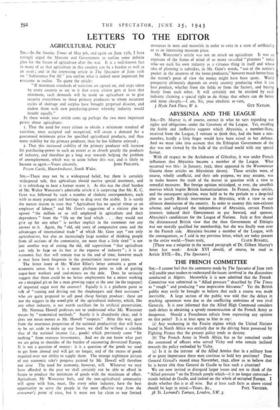AGRICULTURAL POLICY
LETTERS TO THE EDITOR
SIR,—In the Sunday Times of May 9th, and again on June t3th, I have strongly urged the Minister and Government to outline some definite plan for the future of agriculture after the war. It is a well-known fact to many of us that agriculture in this country can be a burden as well as an asset ; and in the interesting article in The Spectator of June 11th on " Subsistence For All " you outline what is indeed most important for everyone to realise. To quote the article: " If minimum standards of nutrition are agreed on, and steps taken by every country to see to it that every citizen gets at least that minimum, such demands will be made on agriculture as to give security everywhere to those primary producers to whom recurrent cycles of shortage and surplus have brought perpetual disaster, and endow them with new purchasing-power whereby industry would benefit equally."
In those words your article sums up perhaps the two most important points about agriculture: t. That the need for every citizen to obtain a minimum standard of nutrition, once accepted and recognised, will create a demand for a guaranteed minimum price for specified agricultural products, and thus more stability for the primary producer, than he has hitherto enjoyed ;
2. That this increased stability of the primary producer will increase his purchasing-power to such an extent as to absorb greatly the products
of industry, and therefore go a long way towards helping the problem of unemployment, which was so acute before this war, and is likely to
become so again.—Yours sincerely, JOHN PHILIPPS. Picion Castle, Haverfordwest, South Wales.






























 Previous page
Previous page